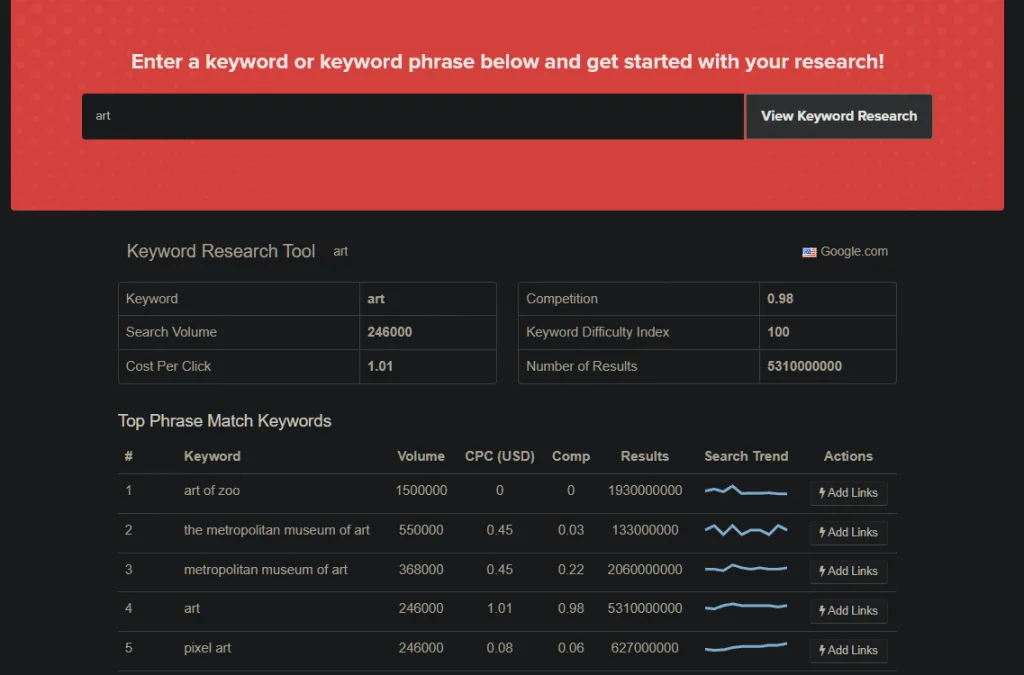While Google always keeps us on our toes with its staggering 600 updates a year, one thing has stayed the same for marketers and that’s website optimization.
Keyword research is one of the most important aspects of SEO and 93% of keywords only get ten monthly searches or fewer.
With that said, I see a lot of people struggle with keyword research, and it doesn’t have to be difficult!
Want to know the most effective (and fastest) methods to find great keywords to target?
The remaining content will define what keyword research is, why it’s important for your SEO strategy, and how to target the best keywords for your website.
Let’s jump in!
What is Keyword Research and Why is it Important?
Advanced Keyword research provides valuable insight into the search intent of your target audience. The insight that you can get with these search terms can then help you create an informed content strategy as well as boost your marketing strategy.
Searchers use keywords to find solutions to any given problem when conducting research online. If your content is successful in SEO, then you get the chance to expose your brand to new audiences.
In fact, 60% of marketers say that inbound (SEO, blog content, etc) is their highest quality source of leads.
In addition, it’s best not to create content around what you want to tell your audience, it’s a good method to create content around what people want to find. Basically, you want your audience to come to you.
All of this can be accomplished with easy keyword research methods.
When Do You Need Keyword Research and Where Do You Start?
It’s generally a good idea to perform keyword research before creating any new content for your website.
Collecting information can be useful when you begin your keyword research.
It will also help ensure that the content you’re creating is actually something that your audience is looking for.
For example, if you know that only around 8% of search queries are phrased as questions, then you may not target keyword phrases that contain too many questions.
Google Search Console is also a great tool for research. Your ranking data can help you identify some of your underperforming keywords that are attached to your content.
You can also find keywords that Google associates with your website that you may have missed.
When researching for keywords in your industry, you might come up with a set of recurring keywords that also show up on your competitors’ websites.
Make a list of your competitors, visit their websites, and observe their target set of keywords.
By knowing which keywords they are using to rank highly, you have a better idea of how to create content for a successful digital marketing strategy.
Let’s move on to some phrases and terms you should know:
Keyword Research Metrics and Terms To Know
When using keyword research tools, you might see metrics about the keywords you analyzed.
Similar to this:
Here’s a quick overview of each of the major keyword research metrics:
Keyword difficulty

Keyword difficulty is representative of competition. This is the metric we use to determine how difficult it is to rank for a focus keyword. Most keyword research tools provide you with a ranking of keyword difficulty.
If too many high-authority websites with many quality backlinks are ranking highly for your focus keyword, it might be a good idea to search for another keyword with less competition.
Monthly search volume

Monthly search volume represents the number of times a keyword was searched in a month and how often it shows on results pages.
Free SEO tools like Google Trends provide you with an estimate on the number of search queries across longer time periods. It’s also known as keyword search volume on some tools.
Cost-per-click (CPC)

Cost-per-click is the amount of money you spend for each click on one of your PPC ads. This metric is essential because it allows you to quantify the expenses of your Google Ads or Microsoft Ads.
Here are a few additional terms you may see regarding keyword research:
Keyword stuffing and cannibalization
Many times, keyword cannibalization is the result of keyword stuffing.
Keyword stuffing is the practice of stuffing pages of content with keywords in hopes it will boost your ranking in SERPs.
Not only does this not work, but it could also cause Google to penalize your website.
Keyword cannibalization happens when you have one too many identical or similar keywords that are spread throughout the content of your website.
As a result, Google can’t tell what content to rank higher.
That can sometimes mean it will give a higher ranking to the webpage that you aren’t trying to prioritize.
How to avoid keyword stuffing:
- Pick a primary keyword for your website
- Keep up with keyword density
- Create longer content
- Select secondary keywords
- Add target keyword to page elements
The solutions for keyword cannibalization:
- Restructure your website
- Create new landing pages
- Consolidate your content
- Find better keywords
- Use 301 redirects
With that said, let’s move on to how to conduct SEO keyword research:
How to Conduct Easy Keyword Research
Now that we’ve talked about the importance of keyword research, it’s time to focus on how to do it.
Additionally, you can use these steps:
1. Come up with a keyword topic list
Brainstorming content ideas for your website is a good starting point for keyword research. This is a great time to step in the shoes of your buyer personas and identify which topics your target audience will search about.
What kind of topics do you want your business website to rank for? If you’re a business in the computer parts industry, for example, you might come up with a list that looks like this:
- Does overclocking damage your CPU?
- What is the difference between CPU and GPU?
- How to assemble a custom PC?
These topics are relevant to the computer industry and represent evergreen content for your website.
An alternative to finding out what your audience is researching is by looking on online forums such as Reddit and Quora.
Once you have assembled a sizable topic list, it’s time to identify the keywords that you’ll be using to rank the content in the SERPs.
There are three major types of keywords:
- Head keywords are popular search terms that have high search volumes. Think of a very general search term like “Christmas cards”.
- Body keywords are two to three words long. For example “digital Christmas cards”.
- Long-tail keywords are phrases that have several words, usually four or more. These tend to be more niche-oriented and hyper-focused on a result. Take a look at “Christmas cards for kids”.
2. Find “easy win” keywords
Did you know you might be sitting on a hidden pile of gold?
If your site has been around for a while, there’s a good chance that with a few changes you could drastically improve your traffic.
The vast majority of the traffic is on the first page of Google – especially in the top 3 positions, which can account for more than 30 percent of the total traffic!
It’s great to be in the top 3, but what about all the keywords that you’re ranking for below that in positions 4-30?
Google already “likes” you for these keywords and sees you as relevant, you just haven’t broken into the top positions.
So if you could find these keywords that your site is ranking for, and boost them up, you could see a massive jump in traffic!
How do you find these keywords?
You can use our free tool: HOTH Google Rankings Checker.

First, enter your URL and click search. After it gathers the data, it will display a list of keywords that your website is ranking for.
Because most clicks go to the top three positions, look for the keywords ranking in the 4-30 slots and focus on boosting those up.
3. Uncover your competitor’s keywords
The task of brainstorming for new keywords can be daunting. Especially in small niche industries, how many keywords are actually relevant to your company?
The good thing is you can just uncover what your competitors are ranking for!
First, go to our free tool HOTH Keyword Gap Analysis, and type in your competitor’s URLs.

They can be direct competitors (where they sell the same thing you do) or indirect competitors (meaning they just market to the same people you do).
Examine the list of the right keywords and take note of the phrases that you aren’t targeting.
Start creating content based on these keywords and give your competitors a run for their money!
4. Find related keywords
When you’re going to create a new piece of content, it’s a good idea to understand the topic at hand to maximize the amount of search traffic you can get from the long tail.
You know your main keyword for the article, but what other facets of the subject should you be including to help rank for additional long-tail phrases?
Here’s how to find those long tails:
First, go to our HOTH free Keyword Planner alternative and put in a seed keyword.
Our tool will spit out a list of awesome long-tail keywords you can use throughout your article to rank for more phrases!
Make sure to include these variations while writing your content.
Understanding Keyword Intent Types
Keyword research identifies the words that best describe the content on your website or content page. It also helps you rank well for the searches that people look for every day. However, there’s more to it than simply matching words to phrases.
Because you know your brand better than anyone else, you may not have the same mindset as potential customers. The terms and phrases you might use to search for your products on the web may not come close to what shoppers are searching for.
As you begin your keyword research, you will want to consider the buyer’s journey and the search intent behind particular phrases, and whether or not your content matches it.
Here are the keyword intent types you should consider:
- Informational: your audience wants to learn something from your content.
- Navigational: your audience is looking for something specific from your website.
- Transactional: your audience wants to compare specific products and is almost ready to purchase.
- Commercial: ready to buy!
When your content keywords match your customer’s intent, they tend to stay on your page for longer. That can help you rank on search engines and even build relationships with your audience.
Let’s move forward to the best free tools for easy keyword research:
Best Tools For Keyword Research
The best part of keyword research is that you don’t have to break your marketing budget to perform it.
There are quite a few free keyword research tools available. Here’s a brief list of the best keyword research tools you can use to come up with your keyword list:
AnswerThePublic

AnswerThePublic is one of the easiest and simplest free SEO tools out there. AnswerThePublic prompts search questions and provides you with raw search insights.
By typing into the prompt, AnswerThePublic will show you long-tail keywords organized in several subcategories: questions, prepositions, comparisons, alphabetical, and related.
AnswerThePublic’s free version only allows you to search up to 3 keywords or phrases per day.
Moz Keyword Explorer

With this tool, you enter an URL or keyword and it’ll take you to the best keywords to target for a specific search.
It shows monthly search volume, keyword difficulty, CTR, keyword opportunity, and suggestions for each term. Its free search results also feature a SERP analysis with 10 pages that rank for your focus keyword.
Ubersuggest

Ubersuggest is a Chrome extension that shows you monthly search volume, CPC, and keyword queries on Google, Amazon, Yahoo, and YouTube.
It has a respectable keyword database and provides you with the number of backlinks you’d need to rank on the first page of Google for a keyword phrase.
Its free version only allows you to search for a single website and three keywords per day.
Ahrefs Keyword Generator

Ahrefs automatically generates up to six keyword ideas reports that contain your seed. To use their keyword tool, you just have to enter up to ten words or phrases for free.
SEMRush Keyword Magic Tool

SEMRush Keyword Magic Tool lets you create an account for free and gives you access to a report featuring monthly search volume, competitive density, and difficulty.
It has useful organizing figures that allow you to sort out your keywords and export your findings to your email.
You’re given access to 10 searches a day with a free account. It can be useful for analyzing your homepage, landing page, and any other subpages on your website.

Google is one of the underdogs of keyword research tools. By using the search engine’s auto-suggest feature, you can get some great ideas about what people are searching for.
For example, if you were to type “cakes”, some options that come up are “cake toppers”, “cake topper happy birthday” and local brands that have the cake keyword as part of their name.
Google’s Keyword Planner can also be used to research keywords. This tool gives you suggestions for keywords related to your products, services, website, and the average cost for your ad to show on searches. It’s also known as Google Adwords.
That’s it!
Keyword research doesn’t have to be a guessing game. You can drastically and quickly improve your traffic by using these methods.
Never forget to analyze the competition for that keyword.
Schedule a call with our team for a step-by-step tutorial on how to perform keyword research for your website.
Also, don’t forget to sign up for free and check out all of our other awesome free SEO tools and resources!



